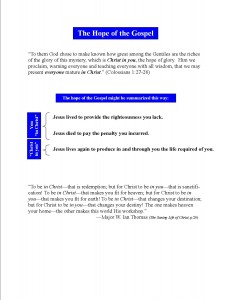Since the time of Jesus’ death, burial, resurrection and ascension, we have been in “the last days” (Acts 2:17; Heb. 1:1-2). Paul was correct, “in the last days difficult times [have] come” (2 Tim. 3:1). Peter’s mockers have shown up by the bus load (2 Pet. 3:3).
To whom are we preaching in these last days? What is the spirit of the age in the run-up to Jesus’ return? The Apostle Paul told us in 2 Timothy 3:1-5. At the root of it all are misplaced affections (vv.2-4).
So what should preaching look like in times like these? What kind of a preacher is God demanding for these demanding times?
I think Jesus’ words from Matthew 24 tell us. “Who then is the faithful and sensible slave whom his master put in charge of his household to give them their food at the proper time? Blessed is that slave whom his master finds so doing when he comes” (vv.45-46).
This tells us that God is calling for a certain kind of preachers and a certain kind of preaching.
Preaching in the last days requires preachers who understand SUBMISSION.
The preacher is called a “slave” (doulos). The slave is one who has given up to another and thus lost any personal will as a determining factor of his life and daily choices. These decisions have been surrendered and given over to a master. In this case the Master is Jesus. Such a preacher may have an opinion (perhaps a very strong one) about his preaching and the specifics of carrying it out, but he has come to the realization that he has no personal will or choice in the carrying out of his call to preach. The message is not his. The congregation is not his. The delivery is not his. The style is not his. The substance is not his. The breadth is not his. The depth is not his. The recognition, reception or reward is not his to decide.
Preaching in the last days requires preachers who understand URGENCY.
This preacher is “on the clock,” in that his Master is returning at an hour which he does not know with certainty. He preaches and serves always looking for the day “when he comes.” All he knows with certainty is that the hour will come when His Master arrives. He preaches every sermon as if it may be his last.
Preaching in the last days requires preachers who understand ACCOUNTABILITY.
This preacher “has [been] put in charge” by the Master. When his Master returns, He will require an accounting of the preacher for his service. He preaches because God is listening and because Christ is judging, coming and ruling (2 Tim. 4:1). He preaches as a steward.
Preaching in the last days requires preachers who understand EQUIPPING.
The word translated “household” refers to the servants which make up the staff that serves the family of the house. This “slave” is thus administratively over the servants and must lead them to appropriate care for the Master and His family. Thus the preacher is called to not only care for the family of God, but, through His preaching, to move the members of the family to serve one another (Eph. 4:11-16). This preacher knows he alone cannot provide all the ministry the “household” needs to reach maturity. He seeks to raise up others to serve the family. He understands his need to feed the feeders of the family. The preacher is a part of the “household,” and thus beloved of God. But he is also over the household, standing in the stead of the Master, identifying, feeding, motivating, releasing and administrating their care of God’s family. The heart of His Master must rule his own heart and his relationship to those who make up and serve the “household.”
Preaching in the last days requires preachers who understand FAITHFULNESS.
This preacher is to be found “faithful” by his Master upon His return. The “faithful” preacher is not free; he is bound by responsibility. He knows no absolute autonomy. There is a divinely given message which must not be altered. There is a divine love that must be communicated. There is a calling that must be fulfilled. There is a Word that must not be altered. There is a day of accounting that must be factored into all he is and does.
Preaching in the last days requires preachers who understand WISDOM.
This preacher is to be found “sensible” by His Master upon His return. The word describes one who is prudent and wise. Obedience to Christ’s word is the touchstone of such wisdom (Matt. 7:24). So this preacher has learned first to search out and live under Christ’s word personally before he dares proclaim it to those to whom he is sent. The word is used again most immediately in the parable of the wise and foolish virgins which follows in Matthew 25:1-13 (cf. vv.2, 4, 8, 9). It describes those who are not lulled into a stupor by the times in which they live. Such a preacher heeds Christ’s warning (“be on the alert,” Matt. 24:42-43) and ever cries with Paul “let us not sleep as others do, but let us be alert and sober” (1 Thess. 5:6)!
Preaching in the last days requires preachers who understand NURTURE.
This preacher looks upon those whom God has put under his charge and understands that he is “to give them their food.” He feeds the flock (Psa. 23:2). He is a good shepherd, feeding not simply himself, but the flock of God (Ezek. 34:1-10). He knows how to give out both “milk” (1 Pet. 2:2) and “meat” (1 Cor. 3:2; Heb. 5:12) according to the need of those God puts before him. But he always feeds with a view to maturity (Heb. 5:14). In physical diet, what we want is not always what we need. He aims not to be popular, spoken of or to impress. He speaks to feed the flock of God under his charge.
Preaching in the last days requires preachers who understand DISCERNMENT.
This preacher understands that he is to give God’s people their food “at the proper time.” He thinks, prepares and preaches strategically—with an acute awareness of both the times in which he and the rest of God’s people live (1 Chron. 12:32) and the peculiarities of their individual needs. Indeed, as a good shepherd, he knows well the condition of his flocks (Prov. 27:23). He also understands “how delightful is a timely word” (Prov. 15:23) and that “Like apples of gold in settings of silver is a word spoken in right circumstances” (25:11). Thus he prays and prepares before the Lord in hopes that his words might be wise.
Preaching in the last days requires preachers who understand HOPEFULNESS.
This preacher serve with an eye to His Master’s pronouncement of “Blessed”! The favor of the Master is his single desire. Hearing his Master’s “Well done, good and faithful slave” (Matt. 25:21, 23) is his driving motivation and abiding goal. He looks not for his rewards in time and space, but in a future, but certain existence in open fellowship with his Master. The applause of the present crowd holds no attraction to him for he performs even now, even here for an audience of One. A million slaps on the back hold not the power of one “Well done,” from his Master’s lips.
Preaching in the last days requires preachers who understand TENACITY.
And all of this, the preacher is to be found “so doing” when His Master returns. He knows that he has been called to speak in momentous times and so to be a “lazy slave” is a great wickedness (Matt. 25:26). Like Ezra of old who “had set his heart to study the law of the LORD and to practice it, and to teach His statutes and ordinances in Israel” (Ezra 7:10), he too is a man of the Word. Thus he rises daily to engage God in His Word—that He might live out the sacred pattern: study—obey—speak. He does not lift his hand from the plow to look back (Luke 9:62) or to gaze around at what others might feel free to do. He is always “making the most of [his] time, because the days are evil” (Eph. 5:16). Like Jesus he says, “We must work the works of Him who sent Me as long as it is day; night is coming when no one can work” (John 9:4).
Preaching in the last days requires preachers who understand LONELINESS.
Have you noticed that Jesus casts this entire matter as a question? He thus points to the rarity of finding such a preacher and such preaching in the last days. Any preacher who stays the course will find himself in a lonely place and often as a lonely person. But in that place the Spirit of the Master will draw him into a fellowship so deep, personal and rich that he will know “him who sticks closer than a brother” (Prov. 18:24). He labors and serves with Jesus’ promise ever on his heart: “He who has My commandments and keeps them is the one who loves Me; and he who loves Me will be loved by My Father, and I will love him and will disclose Myself to him.” (John 14:21).
Heavenly Father, these are perilous days in which you have called us to speak. We often grow weary and discouraged. Feed our hearts richly from your written Word. Give us the humility to preach to ourselves before we preach to others. Give us a heart which preaches from anguish rather than anger. Give us the faithfulness to stay the course and to preserve your Word in days when many do not wish to listen. Save us from playing to applause rather than simply serving you. Let us speak with the anointing of your Spirit. Let us trust to you the results you bring forth. Enable us to serve with an eye to and patiently wait for your “Well done.” In Jesus’ Name, amen.

